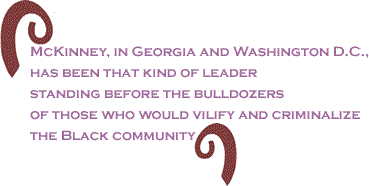
|
|||||||||||||||||||||
 |
|||||||||||||||||||||
|
||||||||||
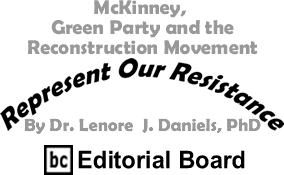 |
||||||||||
 |
||||||||||
|
||||||||||
The current issue is always free to everyone If
you need the access available to a |
||||||||||
 |
||||||||||
“The identification of enemies/scapegoats as a unifying cause,” along with the creation of a “controlled media” in order to point out the “enemies and scapegoats" (Lawrence W. Britt, “Fascism Anyone,” Free Inquiry), represent two principles of a fascist state. This is one explanation for the presence of people living on the “edge” and no one seems to care. Some of us on the Left, measure our engagement with the struggle by remembering Malcolm X, who made no distinction between his personal interests and his public advocacy. He, we say, lived on the “edge.” Many Black, Latino/a, Native Americans, working-class, and poor still live, teetering on the edge of cliff, driven there by a government agenda of genocide and social atmosphere of fear. Leaning too far toward the abyss will result in a neck caught in a dangling noose. With whites and kin at their backs, these people feel the pressure not to live (in a society taught to think “bootstraps!”) but to die, to fall among the others dangling corpses, seen by witnesses to this human tragedy. At a distance, standing behind podiums, before flags and cameras, Republican and Democrats declare their loyalty to the Empire and Christianity, while the people on the edge live everyday as if in a war zone. There’s the effort to educate children in schools where the fear of these children is as massive as it is unrealistic and consequently, reveals a decision, made in advance merely to harbor them until their rebellion makes them ripe for the prison industrial complex. They fear this outcome, those on the cliff’s edge, while scrambling for someone to care for children at home or riding the bus to the next apartment interview to find a home. And today, too, there’s another application to complete at the department store employment desk or at the factory. There’s piece work someone mentioned and a walk of blocks to get there to stand in line. There’s passing people on the edge, too, who just gave up yesterday, last month, last year, years ago, and they work bottles of whiskey and talk alone of giving way to the noose. Someone has a phone and there’s enough change to pay them to call the aid office or Fema, again, or Mr. or Ms. Landlord, again, because the hole where the water is leaking down is larger now than the first call made months ago. There’s buy the milk, cheese, and eggs for the children or help pay for the medicine moma needs for her out-of-control blood pressure.
Sen. Feinstein, Rep. Harman, and others, diligently working to pass Homegrown Terrorist legislation, receive a nod from House Speaker Pelosi who, in turn, winks at King George and Darth Vader. The people and their leaders know prosecution under Homeland Security is yet another indication that COINTELPRO continues for them, and no cameras will capture this state-sanctioned attacks against them. Long time community activist, Curtis Muhammad, recently wondered if “poor black people have been so vilified and criminalized that they are completely off the radar even of the so-called left?” (“Farewell Letter,” November 12, 2007). And it is not intended that the people or their leaders be seen or heard, for even their protest is interrogated and vilified. John Conroy, the reporter who told the story of the practice of torture against over 100 Black men by the Chicago Police Department in the 1980s, spoke of the initial “dead silence” from the mainstream media and the Chicago Police Department (Democracy Now, December 13, 2007). “Capitalism is the systemic terrorism against the poor,” writes Black Commentator Editorial Board Member and Columnist, Larry Pinkney (“Capitalism, COINTELPRO, and the Torture of Justice”).
It is not wonder, then, that the U.S. Human Rights Network, a coalition of 250 social justice and human rights groups across the nation, issued a report December 10, 2007, in which it cited that their “analysis reveals that the Bush Administration is utterly out of touch with the reality of racial discrimination in America,” according to Ajamu Baraka, the Executive Director of USHRN. In contrast to the USHRN report, filed with the United Nations, the U.S. State Department’s report on race “reads like a fantasy,” Baraka claims, “unfortunately a fantasy that is too often experienced as a nightmare for Americans of color.” Even this report is of no interest to the average American citizen. The lived experience of the people living on the edge and their leaders haunts the average American because their presence speaks to — with not even a mouth at a podium — the contradictions inherent in the Empire’s grand narrative of fantasy. The interest of the people and their leaders are simply not those of the white ruling class. Whites of the middle class and even many of their Black and Latino/a counterparts believe that in the end, it will all work out for them and their leaders in government and business. They continue to believe, even when their jobs are outsourced, and when there are no nuclear programs in Iran. They continue to believe in the King and Empire even when torture (conducted by police departments, supported by the FBI and federal justice departments, using cattle prods and plastic bags and water and sticks) sounds like and smells like the practice of spilling blood in Guantanamo and foreign Black sites operated by the U.S. They will sing “Happy Days are Here Again,” and seem to the people on the edge anything but Christian, anything but human.
Most white voters vote to maintain the racial order from whence comes all their power and privilege. They vote their interests. They think, and this thinking is not under threat of criminalization by HR 1955 or S1959 Violent Radicalization and Homeland Terrorism Bill, they think — white America. With all due respect to the insightful work of Naomi Klein, most Black citizens in the U.S. have been accustomed to disaster capitalism for a long, long time. Life for many Blacks, for generations, has been one long experience of the disaster of capitalism, the vulture spirit always at their backs, represented by entrepreneurs who think the “American Dream” and speak the language of money, for as white America can, they profit, profit, profit! In the presidential candidacy of Barack Obama, most whites are still able to see past his brown skin, to their vision of white America. He speaks the language of corporations, of national defense, and of a mumble-jumble health care, much like Hillary Clinton. Obama has no interest in the grand-scale crime committed in New Orleans against the Black and poor, threatened with the demolishing of their HUD homes. With Obama, they can remain comfortably colorblind because he does not threaten their interests. He does not stand on the edge with the people, who he does not know anymore than do his constituents and partners, Bill Clinton’s gang, who now advise him. If only Obama went to the people in just the one community of New Orleans’ Ninth Ward, if only Obama stood alongside community leaders and the people, and think, while you still can, what would happen with the people living on the edge and what would happen among those in the capitalist mainstream, what would the media master puppeteers say of Obama? The answer would not be on Oprah’s show tomorrow because it is a question that each of us knows we can answer without Oprah or O’Reilly’s help. If only he made the cameras that follow him point to the injustice of Mycal Bell in jail and the charges against these 6 Jena children or to the life-long attempt to prosecute the San Francisco 8, even when there is no evidence and there has not been any evidence for 37 years. Obama could appear in Chicago tomorrow and stand with the four Black men who filed suit against the Chicago Police and ask, what is the meaning of delaying justice for these men? But Oprah and the corporate media can’t air that Obama. He does not exist because he has never been a leader of the people. Obama advances the tenets of S1959 Violent Radicalization/Homegrown Terrorism that would control the very thought of protest! (“Obama Supports Homegrown Terrorism,” Jessica Lee, Indypendent News). Who will speak of the interests of the Black, Latino/a, working class, and poor? Who will do more than speak?
While Malik Rahm believes that this “is no time to organize new parties,” New Orleans is, nonetheless, the home of a new grassroots party formed from existing organizations — the Greens of New Orleans and People’s Hurricane Relief Fund (PHRF), and others. The Reconstruction Party (RP) also talked of McKinney running for president on their ticket. According to Bill Leumer, “The Reconstruction Party: A New Political Development,” the Reconstruction Party is a political party attempting to “offer working class Blacks, working people in general and the poor an alternative to the two capitalist parties.” The RP developed a year ago by “abandoned” victims of the hurricane. “The Party focuses on issues fundamental to working people.” Kali Akuno, lead organizer of RP, said that the Party still had to work out its “structural and political agenda,” and, in the meantime, the RP expects to meet with McKinney on December 20, 2007. Sakura Kone, Public Communications, Commonground, looks favorably toward the efforts of the RP party. While Commonground is a non-profit organization and, therefore, can’t endorse the Reconstruction Party or McKinney’s campaign for president, Kone recognizes that “Blacks have not benefited” from the thirty years of Blacks in politics, and it is time, at least for change.
I was not in attendance at the press conference or at the invitation-only session with “local activists” on December 11, 2007, here in Madison, Wisconsin. The Left has a determined agenda in this era of struggle against Empire. As one friend suggested, Blacks in Madison experienced the “ghost of McKinney” — temporarily.
On that day, however, McKinney called on listeners of Wisconsin Public Radio, to understand that the “immediate impact of the economic and political outcome of Bush’s agenda has fallen on Blacks and Latino/as. The continued funding of war has stripped education, employment, health care, and environmental programs in the Black communities," she said. She spoke of the one million Black voters who had their votes “not counted.” McKinney said that she was angry that Blacks were “disenfranchised” by people who denied them the vote. “In some communities hope is extremely rare.” But these are “the people whose voices we must hear,” McKinney told the radio audience. “War cannot be our energy policy.” She decided to campaign on the Green Party ticket, because members of the Green Party “supported her in the past.” We can only hope that the Green Party recognizes not just an electoral opportunity but a movement that would shift the people on the edge agenda to the front and center of this campaign. Perhaps when McKinney meets with the Reconstruction Party in New Orleans this week, they will discuss ways of developing just such a Movement! The peoples’ leader “should be there standing in front of the bulldozers in New Orleans, willing to get arrested,” Roland Sheppard argues. “A leader who won’t get arrested,” claims Sheppard, is no leader. He or she is no leader of the people, no leader living with the people on the edge. To some extent, McKinney, in Georgia and Washington D.C., has been that kind of leader standing before the bulldozers of those who would vilify and criminalize the Black community. Let’s be pro-active in Cynthia McKinney’s agenda because it is the people’s agenda. Then, I think, we can imagine Malcolm smiling, for once. BlackCommentator.com Editorial Board member Lenore Jean Daniels, PhD, has been a writer, for over thirty years of commentary, resistance criticism and cultural theory, and short stories with a Marxist sensibility to the impact of cultural narrative violence and its antithesis, resistance narratives. With entrenched dedication to justice and equality, she has served as a coordinator of student and community resistance projects that encourage the Black Feminist idea of an equalitarian community and facilitator of student-teacher communities behind the walls of academia for the last twenty years. Dr. Daniels holds a PhD in Modern American Literatures, with a specialty in Cultural Theory (race, gender, class narratives) from Loyola University, Chicago. Click here to contact Dr. Daniels. |
||||||||||
| December
20, 2007 Issue 258 |
|
| Printer Friendly Version in resizeable plain text format format |
 |
 |
 |
| |
| |





















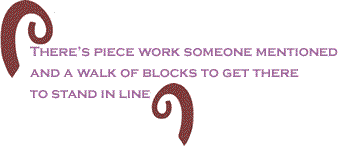 Leadership
among these people has historically been exceptional, not
because leaders wore Baroni suits or shared King’s cadence.
They don’t drive up to the edge: on the precipice, they stand
out front of the people, risking limb and life to challenge
nooses they grab and toss aside, eulogizing the dead in the
hope of new life, standing straight, to force to straight-standing
among the people. The people have their backs because they
are the people, indistinguishable from the other, identical
because their interests are the interests of the people and,
empowered by this knowledge, they (the people and the leaders)
spit in faces of the media puppet masters and turn to face
the people.
Leadership
among these people has historically been exceptional, not
because leaders wore Baroni suits or shared King’s cadence.
They don’t drive up to the edge: on the precipice, they stand
out front of the people, risking limb and life to challenge
nooses they grab and toss aside, eulogizing the dead in the
hope of new life, standing straight, to force to straight-standing
among the people. The people have their backs because they
are the people, indistinguishable from the other, identical
because their interests are the interests of the people and,
empowered by this knowledge, they (the people and the leaders)
spit in faces of the media puppet masters and turn to face
the people. 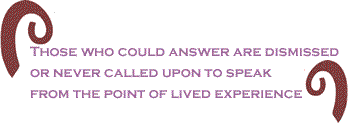 I
often hear liberal radio hosts ask their audiences what makes
people on the “right” vote against their interests. It is
a rhetorical question that they don’t want answered because
they round up the liberal left and flutter in circular chatter
around the commercial selling of the latest car or cruise
or restaurant experience until time is up and night falls
and they ask again in the morning. Those who could answer
are dismissed or never called upon to speak from the point
of lived experience. The people, the Blacks, Latino/a, Native
Americans, working class and poor, living day-to-day on the
edge, is the answer. The people themselves, their existence,
propels votes for a government of law and order, of Nixon,
of Reagan, of Bush, who, in turn, speak of more police and
detention camps, of less money for education, health care,
day care, affordable housing after gentrification. Human
Rights groups have called HUD’s plans to demolish low income
housing projects “an act of racial cleansing,” but who is
reading these reports? Of course, there is no talk of abolishing
racial disparities between crack and cocaine arrests or of
employment advantages for whites. But, let’s rise to broadcast
fame with talk of borders, of privatization, and of corporate
big profits. Let’s hear media announcers, paid with the blood
money of mega-corporations, never talk or show evidence of
chemical waste sites that just happen to be situated in Black
communities, or talk or show evidence of inhumane high energy
bills and the corpses of the elderly dead, and no, never talk
or show the people confronting bulldozers at their backs or
bank collectors chanting into phone, “sub-prime loan - gotcha!”
Promote war, of course, and fear of Osama riding up to the
local mall. Always more war to justify in religious allegory
and supported by Blackwater and Halliburton and their interests.
I
often hear liberal radio hosts ask their audiences what makes
people on the “right” vote against their interests. It is
a rhetorical question that they don’t want answered because
they round up the liberal left and flutter in circular chatter
around the commercial selling of the latest car or cruise
or restaurant experience until time is up and night falls
and they ask again in the morning. Those who could answer
are dismissed or never called upon to speak from the point
of lived experience. The people, the Blacks, Latino/a, Native
Americans, working class and poor, living day-to-day on the
edge, is the answer. The people themselves, their existence,
propels votes for a government of law and order, of Nixon,
of Reagan, of Bush, who, in turn, speak of more police and
detention camps, of less money for education, health care,
day care, affordable housing after gentrification. Human
Rights groups have called HUD’s plans to demolish low income
housing projects “an act of racial cleansing,” but who is
reading these reports? Of course, there is no talk of abolishing
racial disparities between crack and cocaine arrests or of
employment advantages for whites. But, let’s rise to broadcast
fame with talk of borders, of privatization, and of corporate
big profits. Let’s hear media announcers, paid with the blood
money of mega-corporations, never talk or show evidence of
chemical waste sites that just happen to be situated in Black
communities, or talk or show evidence of inhumane high energy
bills and the corpses of the elderly dead, and no, never talk
or show the people confronting bulldozers at their backs or
bank collectors chanting into phone, “sub-prime loan - gotcha!”
Promote war, of course, and fear of Osama riding up to the
local mall. Always more war to justify in religious allegory
and supported by Blackwater and Halliburton and their interests.
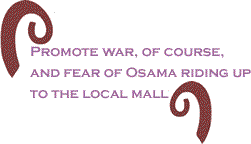
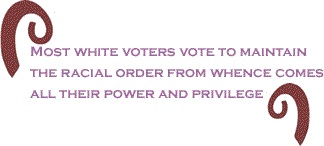 To
use the words of long time San Francisco activist, Roland
Sheppard, Former Congresswoman, Cynthia McKinney, has decided
that she “can’t reform a deformed organization” — this in
reference to McKinney’s departure from the Democratic Party.
She announced her bid for president in 2008, running on the
Green Party ticket. McKinney was here in Madison, Wisconsin
last week at the invitation of the local Green Party. Local
Green Party leader, Larry Dooley, said that he believes McKinney
“agreed to run as a Green (maybe, in part, because of the
work that Malik and others are doing in New Orleans) so she
is willing to give us a chance.” Malik Rahm, founder and head
of Commongrounds in New Orleans, is a firm member of the Green
Party. “If McKinney becomes a candidate, I will become involved
in her campaign,” Rahm told me. “The Green Party is a global
political party” with branches outside the U.S. “It is the
only party,” Rahm added, “advocating for saving our environment.
Fighting for human rights is crucial, but if you can’t breathe
or can’t drink water, you are in trouble," he said.
Rahm is aware that the Green Party New Orleans has a better
representation of Black members than in other branches throughout
the U.S. Rahm acknowledges that we “live in a racist society,”
but he is committed to making the Green Party “the type of
Party that it could be.” In turn, the National Green Party,
“as a whole,” Rahm pointed out, “is missing a golden opportunity”
if it does not reach out to bring in African Americans.”
To
use the words of long time San Francisco activist, Roland
Sheppard, Former Congresswoman, Cynthia McKinney, has decided
that she “can’t reform a deformed organization” — this in
reference to McKinney’s departure from the Democratic Party.
She announced her bid for president in 2008, running on the
Green Party ticket. McKinney was here in Madison, Wisconsin
last week at the invitation of the local Green Party. Local
Green Party leader, Larry Dooley, said that he believes McKinney
“agreed to run as a Green (maybe, in part, because of the
work that Malik and others are doing in New Orleans) so she
is willing to give us a chance.” Malik Rahm, founder and head
of Commongrounds in New Orleans, is a firm member of the Green
Party. “If McKinney becomes a candidate, I will become involved
in her campaign,” Rahm told me. “The Green Party is a global
political party” with branches outside the U.S. “It is the
only party,” Rahm added, “advocating for saving our environment.
Fighting for human rights is crucial, but if you can’t breathe
or can’t drink water, you are in trouble," he said.
Rahm is aware that the Green Party New Orleans has a better
representation of Black members than in other branches throughout
the U.S. Rahm acknowledges that we “live in a racist society,”
but he is committed to making the Green Party “the type of
Party that it could be.” In turn, the National Green Party,
“as a whole,” Rahm pointed out, “is missing a golden opportunity”
if it does not reach out to bring in African Americans.”
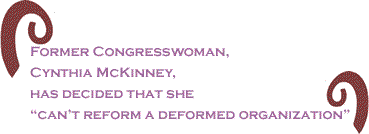 McKinney’s
Power to the People Campaign offers that chance for change.
We would have to come together in the recognition that conflict
and confusion is a way of being because it is the way of capitalism
for those seeking Empire and for many on the Left seeking
reforms that maintain their way of life. McKinney’s commitment
to the struggle of people on the edge justifies support for
her campaign.
McKinney’s
Power to the People Campaign offers that chance for change.
We would have to come together in the recognition that conflict
and confusion is a way of being because it is the way of capitalism
for those seeking Empire and for many on the Left seeking
reforms that maintain their way of life. McKinney’s commitment
to the struggle of people on the edge justifies support for
her campaign. 